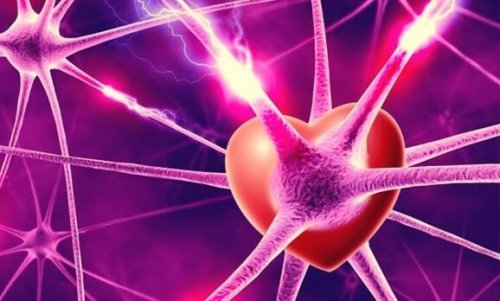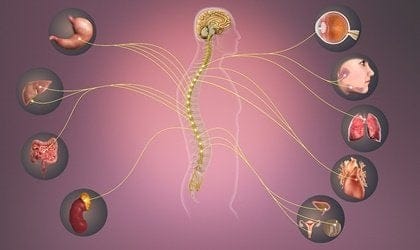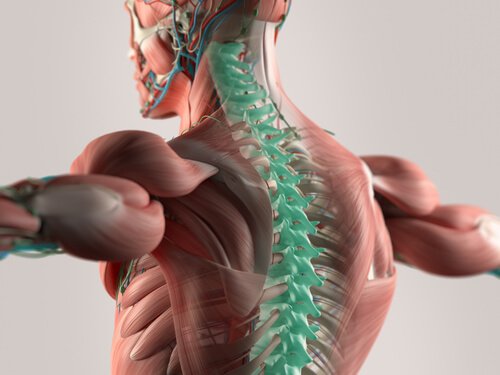(Exploring your Mind) Although you may not know anything about the sympathetic nervous system, it plays an important role in your everyday life. Read on to learn more about this crucial part of your autonomic nervous system!
Related Stress: It’s Not in Your Head, it’s in Your Nervous System
by Staff Writer, June 6th, 2019
The sympathetic nervous system, a complex and fascinating part of the human body, is responsible for regulating situations that cause anxiety and stress. It reacts when your body senses danger.
You probably aren’t aware of how often this system springs into action in your day-to-day life. This is because you don’t have to be in actual danger for your sympathetic nervous system to activate.
Humans Are Designed to Survive
Factors such as everyday stress or pressure tell us something about the human body: humans are designed to find a way to survive or to have control (or try to have control).
Thus, routine things such as running to catch the train, arriving to work on time, catching the mug just before it hits the ground, stopping your cat from running away, and stopping your baby from putting dangerous things in their mouth are all examples of the importance of the sympathetic nervous system.
Everyone knows what happens to your body in those situations. Your heart beats faster, your muscles tense, and you can do things much faster than usual. All of these physiological processes that respond to a stimulus and emotionally intense situations are orchestrated by your sympathetic nervous system.
“Life is only bearable when the mind and the body are in harmony, and there’s a natural balance between the two, and each has a natural respect for the other.”
-D.H. Lawrence-

Buy Book Keep Calm and Breathe
What’s the Sympathetic Nervous System?
The sympathetic nervous system is one of the branches of the autonomic nervous system. This structure is in charge of many involuntary functions such as heart rate, digestion, and sweating. The autonomous nervous system includes the sympathetic, parasympathetic, and the enteric nervous system.
- The sympathetic nervous system regulates and activates your reflexes and reactions. As we mentioned above, this organic center allows you to react to any “non-neutral” stimulus. According to a study from the Kansai University of Welfare Sciences in Osaka, a non-neutral stimulus is any stressful situation.
- The system is made of a chain of 23 ganglia that connect to both sides of the spinal cord and to the organs that they innervate.
- The sympathetic nervous system is made up of two types of neurons. The first are preganglionic neurons, which connect to the spinal cord and the ganglion itself. Also, this system needs the neurotransmitter acetylcholine to function properly.
- The postganglionic system regulates the sympathetic system. It needs noradrenaline to communicate between the ganglion and the organ that it innervates (the heart, liver, stomach, intestines, lungs, etc.)
Sympathetic Nervous System Parts
Now that we know how the different parts of this system connect to each other, let’s take a look at their distribution:
- Exit area. The brain stem regulates a wide spectrum of unconscious and vital functions.
- Cervical area. Where the nerves of the head and neck begin.
- Upper cardiac area. All of the vascular branches that correspond to the carotid plexus, the submaxillary zone, the pharynx, the larynx, etc.
- Thoracic area. Everything from both sides of the spine, including joints, intercostal nerves, etc.
- The lumbar area. Including the psoas muscle, the inferior vena cava, etc.
- The pelvic area. This area goes from your sacrum to your rectum.
Buy Book Art Heals: How Creativity Cures the Soul
What Happens When the Sympathetic Nervous System Activates
If you suffer from something as common as high blood pressure, you might like to know how the sympathetic nervous system relates to general health. In fact, studies like this one published in the Journal of Human Stress explain this link and even differences between men and women.
The way the sympathetic nervous system activates in dangerous or stressful situations is as interesting as it is complex. Let’s see how things would actually play out during a reaction to a threatening situation:
- The body releases adrenaline and noradrenaline into the blood through the kidneys. This is because you need more energy and activation to be able to react.
- Your heart rate increases to pump more oxygen and nutrients into the blood.
- Your lungs work overtime to provide your body with more oxygen (bronchodilation).
- Digestion slows down. Remember that digestion requires a lot of energy, and this isn’t a priority when you’re stressed or in danger. The only thing the brain focuses on at that moment is reaction you so can deal with the stressful situation.
- At the same time, the sympathetic nervous system sends signals to your brain to dilate your pupils. This unconscious reaction allows you to see more clearly so you can react safely.

Know Your Body
In conclusion, just like philosopher Henri-Frédéric Amiel said, your body is the perfect temple of nature. You only have one body, so it’s your responsibility to learn about it and take care of it. Body awareness will help you understand yourself and others better. It’ll teach you that you are who you are. If you’re in touch with your body in a more intimate way, you’ll know right away if something changes or you have health issues. Learning about the sympathetic nervous system and other bodily structures is fascinating.
Stillness in the Storm Editor: Why did we post this?
Psychology is the study of the nature of mind. Philosophy is the use of that mind in life. Both are critically important to gain an understanding of as they are aspects of the self. All you do and experience will pass through these gateways of being. The preceding information provides an overview of this self-knowledge, offering points to consider that people often don’t take the time to contemplate. With the choice to gain self-awareness, one can begin to see how their being works. With the wisdom of self-awareness, one has the tools to master their being and life in general, bringing order to chaos through navigating the challenges with the capacity for right action.
– Justin
Not sure how to make sense of this? Want to learn how to discern like a pro? Read this essential guide to discernment, analysis of claims, and understanding the truth in a world of deception: 4 Key Steps of Discernment – Advanced Truth-Seeking Tools.
Stillness in the Storm Editor’s note: Did you find a spelling error or grammar mistake? Send an email to [email protected], with the error and suggested correction, along with the headline and url. Do you think this article needs an update? Or do you just have some feedback? Send us an email at [email protected]. Thank you for reading.
Source:
https://exploringyourmind.com/the-sympathetic-nervous-system/


Leave a Reply